Push for Federal Government to ban children from tackling in ALL sports: ‘we’re raising a generation of brain-damaged kids’
Leading brain injury experts are calling for a ban on children under the age of 14 from playing sports, following the findings of this week’s Senate inquiry into concussion.
Concussion and brain trauma have come under scrutiny in recent years, with a large number of former athletes dying from complications caused by CTE.
CTE, or Chronic Traumatic Encephalopathy, is a brain disorder that often occurs in athletes who have suffered repeated head injuries. It can lead to memory loss, mood swings and other cognitive problems later in life.
Currently, the diagnosis can only be made after death, with some athletes donating their brains to science for further research.
Brain experts have recommended that children under the age of 14 should be banned from tackling in sports such as rugby league, rugby union and Aussie Rules.
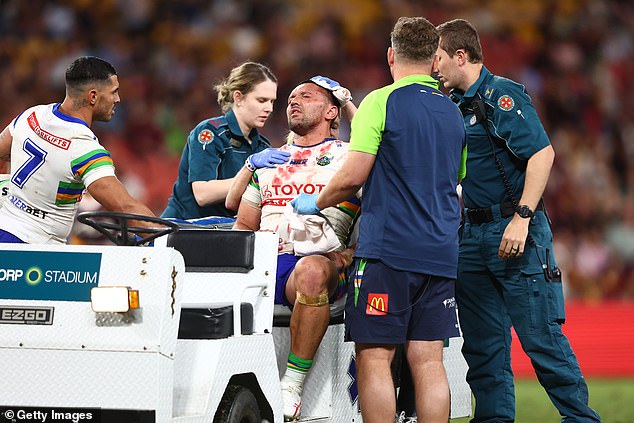
The Canberra Raiders’ Jordan Rapana was one of several NRL players to suffer a sickening head injury this season
Athletes who have committed suicide due to CTE include NRL star player and coach Paul Green, AFL icon Danny Frawley, Richmond star Shane Tuck and AFLW premiership hero Heather Anderson.
The AFL is also facing a number of class action lawsuits from former players suffering from concussion.
The Senate Inquiry into Concussion has made thirteen recommendations, including a call for the federal government to implement a national strategy to reduce concussions in contact sports.
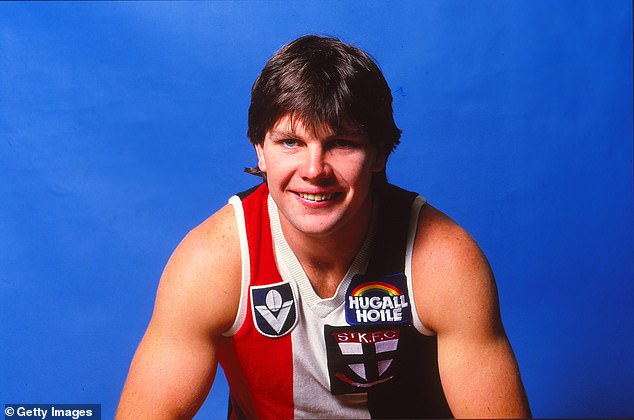
Danny ‘Spud’ Frawley took his own life due to complications from CTE after suffering a number of head impacts during his playing career
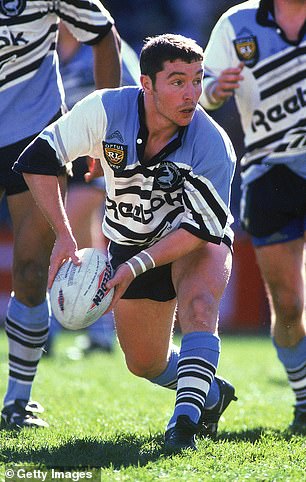
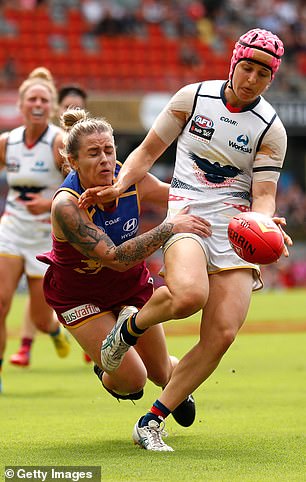
NRL star and coach Paul Green took his own life just before his 50th birthday, while AFLW star Heather Anderson became the first Australian woman to die with CTE
Professor Michael Buckland, now chief specialist at the Australian Sports Brain Bank, has called for the world’s first action to ban children from all contact sports until the age of 14 or risk “a generation of brain-damaged children”.
“Every code needs a CTE minimization protocol. It should be based on two fundamental things: the first is reducing the cumulative lifetime exposure to these significant, repeated head impacts, and increasing the age at which first exposure occurs,” he said. he. News Corp.
“So until we know better, until we have good data on every player, from amateur to the highest level, we have to take the precautionary principle because the children are our future.
‘We will depend on children when we are old and crumbling, if we encourage them to suffer brain damage when they are young we will be full.
“So the precautionary principle is incredibly important here, it should not be addressed at least until high school, 14 is good.”
Neurology expert Dr. Alan Pearce backed these calls, saying CTE is claiming the lives of young adults and something needs to be done about it when aspiring athletes are still children.
“You talk to a male or female teenage athlete about what could happen to him at age 40 or 50, that’s two lifetimes away,” he said.
‘We published the first case study of a female athlete with CTE, in Heather Anderson, she was only 28. We see a lot of young people with brain disease because they are exposed to contact sports at some point, men and women. younger age.
‘This is not just a disease of the elderly. If we don’t take care of the brains of our boys and girls, we will see more of this.
“Unlike America, which has a college sports system, we have a club system. So there are potentially hundreds of thousands of men and women who play club sports, go unnoticed, and suddenly start to develop a mental illness or an unexplained mental illness, and something catastrophic happens. And we’ll never know.
‘I want people to exercise, I am not anti-sport at all. I just want us to play it safe, and for them to be able to play full contact versions if they can make that informed choice.
‘We simply don’t want children under the age of 10 or 12 playing contact sports, which potentially means hundreds of brain haemorrhages throughout the year. We want them to practice these sports, but in an adapted form.’
Although athletes cannot be diagnosed with CTE until after their death, a number of prominent stars have come forward after revealing they suffer from symptoms of the brain disease.
That includes AFL great Greg ‘Diesel’ Williams, who has no memory of getting married, the birth of his four children or winning a grand final.
“It’s definitely an issue, my memory, both (short and long term),” he said in the recently resurfaced video of him appearing on the All Fun & Games with Rav Thomas podcast in 2020.
“The things I worry about are the things I can’t remember, like no games, the birth of my children, getting married, I just can’t remember anything.
‘I know I played in the grand final in 1995 but I can’t remember. Pretty much most games (I can’t remember) are pretty bad.
‘I’m still functioning, but… it’s a big problem. It’s just sad really.’
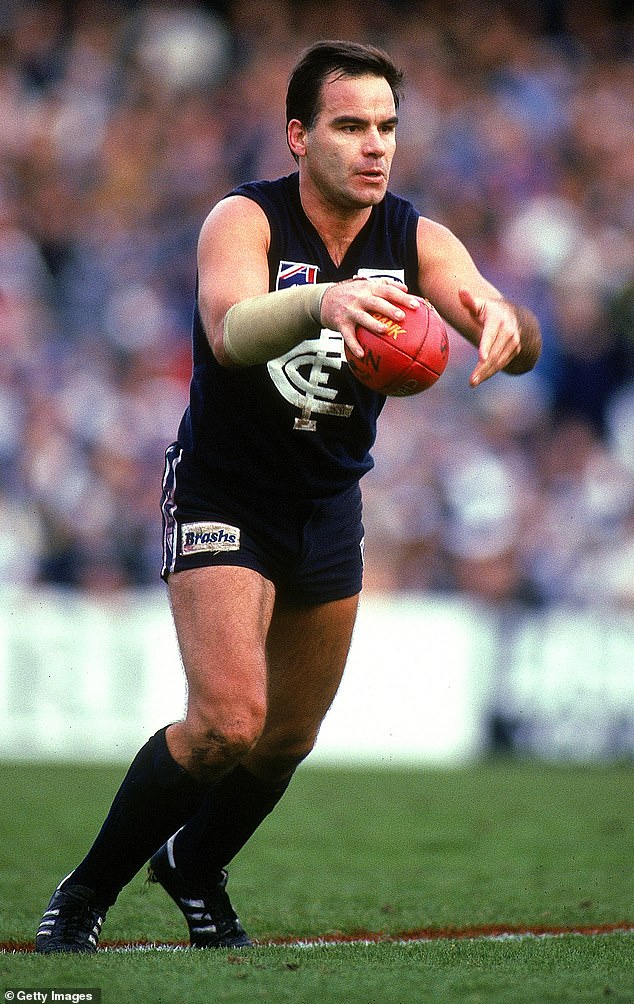
Greg ‘Diesel’ Williams played for Carlton, Sydney and Geelong in the AFL and now he can’t remember his wedding or winning the premiership
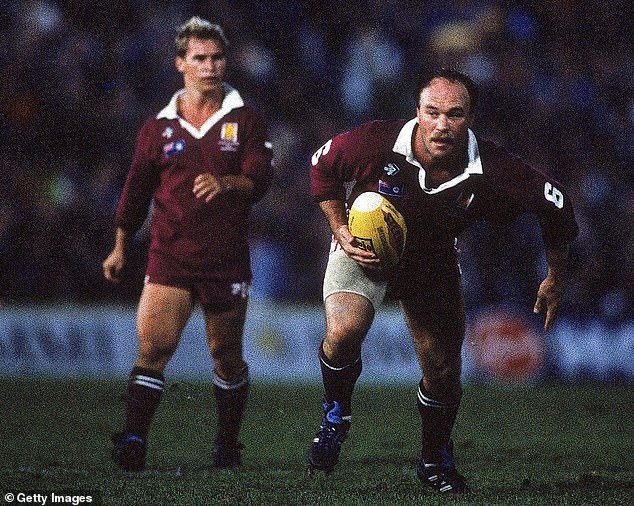
Wally Lewis (right) was known as one of the strongest and most skilled players to ever tie a boot, but now the rugby league star is suffering from symptoms of CTE
Doctors have also found NRL legend Wally Lewis has a 90 per cent chance of suffering from CTE after he signed up for brain scans when his family became concerned he was repeating stories.
“For a lot of athletes, I think most of us have this belief that we have to prove how strong we are… how tough,” Lewis said.
“But we have to accept it and admit that the problems are there.”
And former Wallaby Brett Sheehan came dangerously close to taking his own life after suffering 30 serious concussions during his rugby career.
“There are a lot of things that can contribute to mental health, CTE, because I’m not dead. We obviously can’t diagnose it, we can’t say that CTE was a major factor in it,” Sheehan said.
‘But what we do know is that repeated brain injuries, such as concussions, have an effect on your mental health, and that has been proven.’
Lifeline 13 11 14
Beyondblue 1300 22 4636

